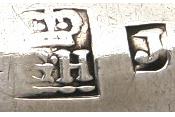|
A
relevant number o silverware was produced in the British
Colonies where the hall-marks acts were not in force. In
these Countries pseudo hallmarks (marks of fantasy similar
to those adopted by the British Assay Offices) have been
some time used.
Colonial
silver represents an interesting collector sector, but it
can be expensive due to the lack of marked silverware
produced in the British Colonies. Furthermore genuine
hall-mark has not been yet completely recognised and
documented in dedicated books and publications.
Hallmarks
can be mainly found on silverware produced in those
Countries where British silversmiths emigrated to. The
principal Colonies are: India (mainly marks from Hamilton & Co.
who often use an elephant probably as town mark, Pillar & Co.
and Twentyman & Co., all based in Calcutta, with
documented marks since 1810), South Africa, Australia,
New Zeeland, Canada, Jamaica (marks documented since 1800), Barbados e
China (where between 1870 end 1920) pseudo hallmarks very
similar to the original British ones were used.
The
most famous silversmith operating in India was Robert
Hamilton (click on the link to see history and
marks).
Some
of most prolific makers in Calcutta:
Before
1820: William Henry Twentyman (WHT), John Hunt,
Joseph Rondo, Hippolitus Poignand, John Mair I





Calcutta.
Up: mark of W.H.Twentyman circa 1820 and Twentyman Beck & Co,
circa 1821. Middle: marks of Twentyman & Co., circa
1824-1829 and 18291836 respectively. Down: John Mair I, circa 1798-1801.
Before
1860: Pittar & Co. (P&Co); Charles, Nephew &
Co. (CN&Co); Arthur Pittar, Lattey & Co.
(APL&Co)

Mark
of Lattey Brothers & Co, Calcutta (India),
circa 1850-1856 (see the
ite description)


Pittar
& Co, Calcutta, circa 1825-1828

B.G.
(?) Mark found on a set of
forks, some of them marked Pittar, circa 1825-1828
Some
of the most prolific makers in Madras around 1800: Hugh Gordon, Robert Gordon, George Gordon, George
Gordon & Co. (GG&Co)
Madras,
From 1848: P. Orr & Sons (still operating in Madras:
often only the mark ORR was struck).

Marck
of Peter Nicholas Orr, Madras 1854 - present
Other
British colonial marks

Mark
from Lawrence Twentyman (ca 1800), Cape town (South Africa).

Jamaica,
1790
^Top
|

